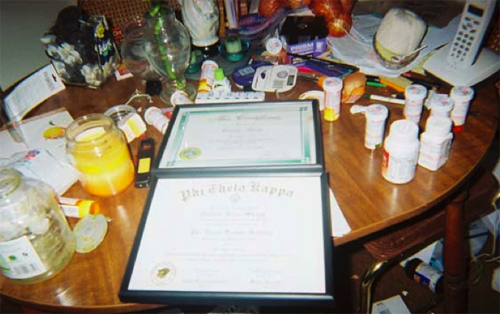Celeste: My Story

Living with bipolar disorder (also called Manic Depression) is difficult. Sit back while I tell you what a wild ride it is and tell you the symptoms in both children and adults. I have had the symptoms of bipolar disorder since I was a child, but was just diagnosed as an adult.
The biggest problem I have with the mental illness is the constant roller coaster ride of emotions – one minute I am euphoric, the next I am on the lowest low, and it cycles back again (never knowing which end you are going to receive). I am on medication now that controls the mood swings. I no longer have the drastic mood swings.
When I am in a manic state, I tend to be very impulsive, go on spending sprees, talk very fast, be easily distracted, jump from one thought to another, and my mind tends to race. I also have poor judgment, aggressive behavior, increased energy, and am in an extremely “high” or good mood when I am in a euphoric state. The symptoms of bipolar disorder that I don’t have include: increased sex drive; lasting periods or behavior that are different than usual; abuse of drugs, particularly cocaine, alcohol, and sleeping medications; extreme irritability; unrealistic beliefs in one’s abilities or powers; denial that something is wrong; or provocative or intrusive behavior.
Although I can be restless and easily distracted during a manic or depressed episode, most of my symptoms are different when I am in a depressed state. When I am feeling depressed I have a lasting sad or anxious mood, decreased energy, a change in sleeping and eating patterns, and suicidal thoughts. I also feel guilty, worthless or helpless, feel hopeless or pessimistic, and I lose interest in activities I enjoy. The only symptoms of depression I do not have are chronic pain that is not caused by physical illness or injury, and suicide attempts.
Due to the bipolar disorder, I almost had a breakdown in August of 2000. I sat on the side of the road crying, while both sitting as still as a statue and shaking like a leaf at the same time. I could not handle one plan falling through while three others were not moving as fast as I would like. After I cried for about ten minutes and said a Hail Mary, a friend offered me a ride home, and I could not give her a straight answer. She drove me home and I started crying again. Then, I started to watch the musical comedy, “Hello, Dolly,” and cried even harder until I cried myself to sleep.
It is important to remember that with proper treatment (medications and counseling) and prayer that you can be successful. Successful people with bipolar disorder include actress Patty Duke, who was in films like “Valley of the Dolls,” “The Miracle Worker,” and “Me, Natalie,” and actress Vivien Leigh, who played Scarlett O’Hara in “Gone with the Wind.”
I want to recover because I want to have a steady job and do well in school. What helps me to recover is I seek out help from my support system, and I am determined to recover. I would like to do work in psychology or psychiatry so others have an easier time. So I can help others so they don’t have to struggle like I did.
Yes! You can be successful and have bipolar disorder. It can be emotionally crippling, but it is not a death sentence.
